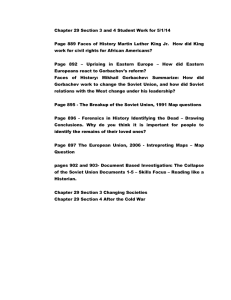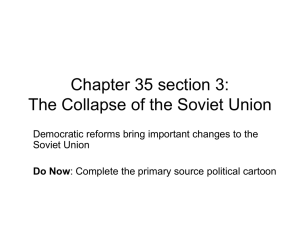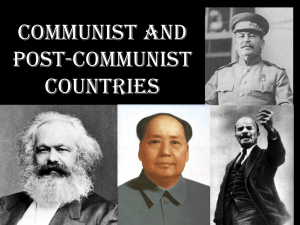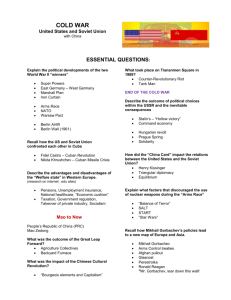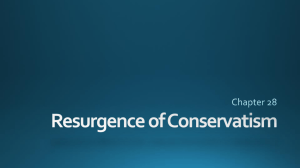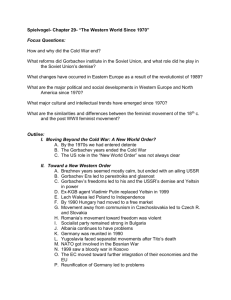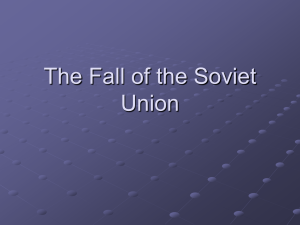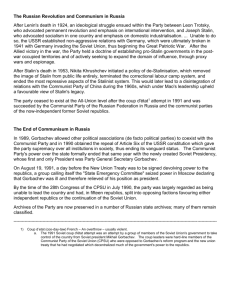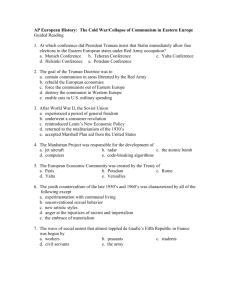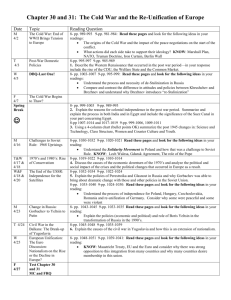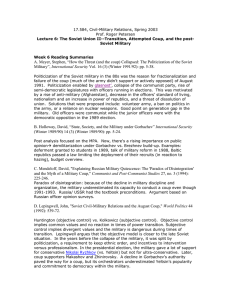A New Federal Union?
advertisement
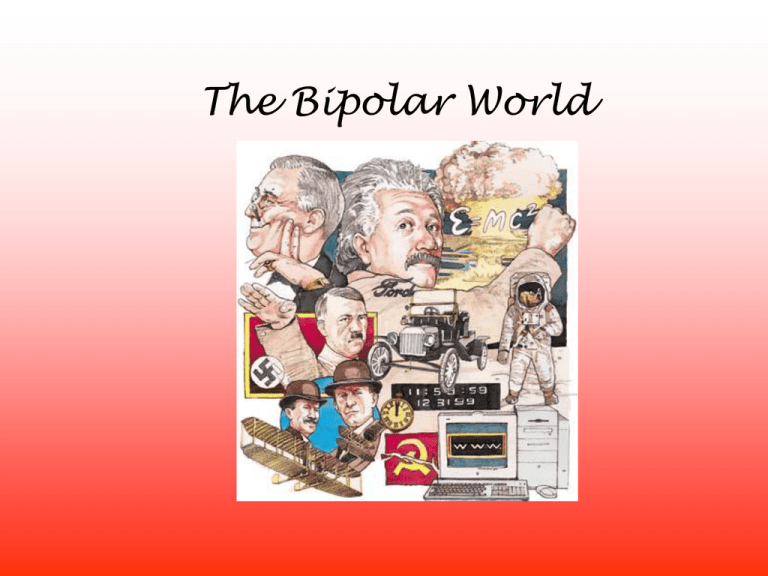
The Bipolar World The Soviet State in 1980s • The state was able to destroy any political opposition, but was unable to modernize the economy or improve the living standards for the population. • Early 1980s: No economic growth, unable to compete militarily or economically with the West. 25% of the national income spent on the military spending… • High corruption! State officials were devoted to advance their own interests, not to serve public interests. Mikhail Gorbachev Soviet leader 1985-1991 1989, Gorbachev announced restructuring of USSR, withdrawal from cold war Satellites states informed that each was on its own, without Soviet support Rapid collapse of communist regimes across eastern and central Europe, 1989 In Poland, Solidarity leader Lech Walesa won election of 1990 Communism overthrown in Bulgaria and Hungary Czechoslovakia's "velvet revolution" ended communism in 1990, divided into Czech Republic and Slovakia in 1993 Only violent revolution was in Romania; ended with death of communist dictator East Germany opened Berlin Wall in 1989; two Germanys were united in 1990 The Balkins • Nationalistic movements in the former Yugoslavia led to “ethnic cleansing” in which Muslims were slaughtered by Serbians. • UN and NATO involvement in the 90s Gorbachev's reforms Gorbachev hoped for economic reform within political and economic system • Perestroika: "restructuring" the economy Centralized economy inefficient, military spending excessive Declining standard of living, food shortages, shoddy goods • Glasnost: "openness" to public criticism, admitting past mistakes • Opened door to widespread criticism of party and government •Alienated those in positions of power, military leaders Collapse of Communism in Eastern Europe • 1989. Gorbachev seemed to be willing to undertake an internal reform in Eastern Europe: “Life itself punishes those who delay.” • All the regimes making up the Socialist Bloc collapsed and gave way to multiparty, parliamentary regimes. • However, Gorbachev’s reforms in the USSR had consequences that clearly he did not intend! Elections in the U.S.S.R. • Elections for Supreme Soviets in 15 Republics and for Soviets in regions and towns all across the country in 1990 stimulated popular, nationalist movements in many republics! • Three Baltic Republics (Litvania, Latvia and Estonia) declared their intention to secede from the USSR. • In Russia (core republic), Boris Yeltsin (a man that Gorbachev neither liked nor respected) won election as the chairman of Supreme Soviet in June 1990. • In 1990, as an elected chief of state in the Russian Republic, Yeltsin had considerable advantage to mobilize public support and to challenge Gorbachev! • Keep in mind! Gorbachev was the state president of Soviet Union (never elected!), Yeltsin was the chairman of Supreme Soviet in Russia (popularly elected!). • Their rivalry formed a backdrop for the dramatic events that led to the collapse of Soviet Union. A New Federal Union? • Gorbachev sought to find new terms for a new federal union acceptable to Yeltsin and leaders of other Republics. • Agreement in April 1991 with 9 out of 15 republics, including Russia, regarding the outlines of a new federal union: ---A weak federal government that would stay to manage basic coordinating functions. ---Republics would have power to control the economy on their own territory. • Russian Republic followed the example of the USSR and created a state presidency in June 1991. • Boris Yeltsin was elected as the state president of Russian Republic. He was even more powerful now! • In the mean time, Gorbachev had underestimated the opposition within the CPSU for the new federal union. The Coup against Gorbachev • Gorbachev’s own vice-president, defense minister, KGB Chief and other senior officials attempted a coup in August 1991. ---placed Gorbachev in house arrest ---took over state power, let troops occupy critical locations in Moscow and other cities. • Yeltsin opposed the coup! After learning of the coup, he rushed to the Russian parliament, the White House, which was surrounded by troops and began organizing resistance. In a famous August 1, 1991 street scene, Yeltsin standing on a tank in front of the parliament building, publicly defying the coup plotters. Thousands of demonstrators turned out to back him and to protect the Parliament building! In Moscow and St. Petersburg, thousands of citizens rallied against the coup and for democracy and Russian sovereignty. In the photo below, Yeltsin greets thousands of people at a huge rally at the parliament, which becomes the unofficial headquarters of democratic resistance. Demise of the U.S.S.R • Coup collapsed on the 3rd day and Gorbachev returned to office, but his credibility was fatally undermined… • By September, Baltic Republics were off to a shaky start, the New Federal Union Treaty was put on hold indefinitely. • In December, 11 of remaining 12 republics agreed to form the Commonwealth of Independent States. • Gorbachev resigned his position as president, the Soviet Union ceased to exist…By January 1, 1992, Russia, biggest chunk from the Soviet Union, became an independent country. China under Mao Zedong 1949 - 1976 Civil War (1946 – 1949) • KMT: Kuomindang (Nationalist Party) – Chiang Kai-shek (President) • CCP: Chinese Communist Party – Mao Zedong Timeline • • • • • • KMT-CCP Civil War (1946-1949) Recovery and Socialism (1949-1956) Rethinking the Soviet model (1956-1957) Great Leap Forward (1958-1961) Recovery & growing elite division (1962-5) Great Proletarian Cultural Revolution (1966-1976) Mao Zedong • A revolution to remove “3 big mountains” – imperialism – feudalism – bureaucrat-capitalism • A “United Front” of … – workers – peasants – petty bourgeoisie and national bourgeoisie Economic Reconstruction 1950s • • • • Soviet Union model and assistance land reform (eliminate landlord class) heavy industry (state-owned enterprises) First National People’s Congress (1954) – PRC Constitution • Zhou Enlai – Premier – Foreign Minister Great Leap Forward (1958-1960) • abandon the Soviet model of economic development – Soviet “scientific planning” • mass mobilization • people’s communes Great Leap Forward (1958-1960) • unrealistic output targets – industry – agricultural and human disaster Growing Division (1962-1965) • Mao Zedong vs. Liu Shaoqi and Deng Xiaoping • charismatic leadership vs. bureaucracy Cultural Revolution (1966-1976) • Mao’s goal was to discourage anything approaching a privilege ruling class • To accomplish this Mao issued reforms meant to erase all traces of Western influences • Many universities were shut down for 4 years and the students and faculty went to collective farms for “cultural retraining” • Many political dissidents were imprisoned or killed • Mao’s “Little Red Book”, a collection of teachings on communism, became a popular symbol of the Cultural Revolution • The whole plan failed miserably in advancing China socially or economically Diplomatic Breakthrough • 1971, PRC became the representative of China in UN (replaced ROC) Diplomatic Breakthrough • 1972, President Nixon visited Beijing Mao and Zhou Died in 1976 • Turning point in China’s postwar era • Deng Xiaoping takes over, new leadership quickly changed the educational policy and began to focus on restructuring the economic policies • End of the Cultural Revolution 1979 - Diplomatic relations established with the US. 1986-90 - China's "Open-door policy" opens the country to foreign investment and encourages development of a market economy and private sector. 1989 - Troops open fire on demonstrators who have camped for weeks in Tiananmen Square initially to demand the posthumous rehabilitation of former CCP General Secretary Hu Yaobang, who was forced to resign in 1987. The official death toll is 200. International outrage leads to sanctions. 1989 - Jiang Zemin takes over as Chinese Communist Party general secretary from Zhao Ziyang, who refused to support martial law during the Tiananmen demonstrations. 1989- Stockmarkets open in Shanghai and Shenzhen. 1992 - Russia and China sign declaration restoring friendly ties. 1993 - Jiang Zemin officially replaces Yang Shangkun as president. 1993- Preliminary construction work on the Three Gorges dam begins. It will create a lake almost 600 kilometres (375 miles) long and submerge dozens of cultural heritage sites by the time it is completed in 2009. 1997 - Hong Kong reverts to Chinese control. 1998 - Zhu Rongji succeeds Li Peng as premier, announces reforms in the wake of the Asian financial crisis and continued deceleration of the economy. Thousands of state-owned enterprises are to be restructured. About four million civil service jobs to be axed. 2000 - Crackdown on official corruption intensifies, with the execution for bribe taking of a former deputy chairman of the National People's Congress. 2001 June - China carries out military exercises simulating an invasion of Taiwan, at the same time as the island's armed forces test their capability to defend Taiwan against a missile attack from China. 2001 November - China joins the World Trade Organization. 2002 February - US President George W Bush visits, on the 30th anniversary of President Nixon's visit to China - the first by a US president. 2002 November - Vice-President Hu Jintao is named head of the ruling Communist Party, replacing Jiang Zemin, the outgoing president. Jiang is re-elected head of the influential Central Military Commission, which oversees the armed forces. 2003 March - National People's Congress elects Hu Jintao as president. He replaces Jiang Zemin, who steps down after 10 years in the post. 2004 November - China signs a landmark trade agreement with 10 southeast Asian countries; the accord could eventually unite 25% of the world's population in a free-trade 2005 August - China and Russia hold their first joint military exercises. 2006 May - Work on the structure of the Three Gorges Dam, the world's largest hydropower project, is completed. 2007 June - New labor law introduced after hundreds of men and boys were found working as slaves in brick factories. 2007 July - China's food and drug agency chief is executed for taking bribes. Food and drug scandals have sparked international fears about the safety of Chinese exports. 2007 September - A new Roman Catholic bishop of Beijing is consecrated the first for over 50 years to have the tacit approval of the Pope. 2008 March - Pro-independence protests in the Tibetan capital Lhasa turn violent and spread to other cities in Tibetan-populated areas. Chinese police respond, with varying reports of casualties.
